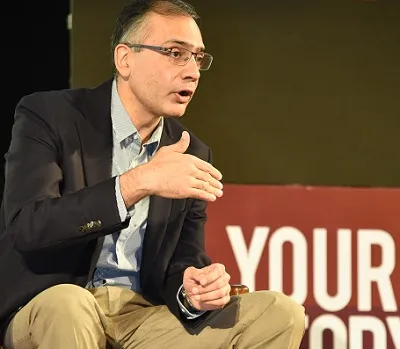Entrepreneurs, how to win the game in the long run
While it’s heartening for entrepreneurs to see their peers raising funding and getting into the billion-dollar club, it gets frustrating at times as well. Through his own story, Deep Kalra, founder of a (now) unicorn, shares why he is disgusted with the whole business of throwing around terms like 'unicorn'. He gives some tips on how to win the long-term game.
Unicorns are mythical creatures, conjured up by fabulists for centuries. They are not rooted in reality. So the reason why billion-dollar startups came to be called ‘unicorns’ was the sense of awe that a creature like a unicorn evoked in people. It is considered an achievement to join this exclusive club, and just like other exclusive clubs, this too gave rise to an elite class among entrepreneurs. Unfortunately, entrepreneurship, by its very collaborative nature, can’t thrive on this bifurcation. Moreover, with more than 200 billion-dollar companies, the 'exclusivity' aspect of the club is lost and all we may be left with is an intrusive division.

Bill Gurley, an early investor in Uber and Snapchat, addressed the outcome of too many unicorns, and 'decacorns'—companies with valuation of $10 billion or more—when he said, “More people are employed by money-losing companies in Silicon Valley than ever before”.
Bill was quick to predict dead unicorns in early 2015. He said,
If the free flowing capital, which is driven by low interest rates, ever dries up, it will affect more than just money-losing startups.
Earlier in September 2016, billion-dollar company Mode Media shut down after raking in $90 million in revenues the previous year. This may be just an exception where mismanagement of funds had a domino effect and an eventual shutdown, but one cannot deny the fact that with more unicorns around, the essence of a startup and its focus on right metrics is in the danger of being lost.
Out of 30,000 tech startups in India, nearly 3,000 have received external funding. While bootstrapping is a choice, many startups of the remaining 90 percent—2,7000 startups—have been trying hard to get funding. And with each funding and valuation discussion, it gets tough to maintain focus. Anupam Garg, an ex-startup founder, says,
“We were working towards getting some traction while not losing track on profitability. But when we saw companies with relatively poorer numbers getting funded around us, it did bother us, and we can’t deny it. This happens in many sectors where you see follow-up round of investments jeopardising many first-round investments(of early stage startups with similar business model).”
In a recent interaction, Deep Kalra, founder of MakeMyTrip (MMT), shared his views on this. He said,
I think that the whole business of using words like 'unicorn', 'pentacorn' and 'decacorn' is disgusting, because I’ve been a struggling entrepreneur for really long.
'Very often you’ve done nothing to deserve it'

Deep shared that his darkest years were between 2001 and 2004, when the company had just enough funds for two months' salary (of employees). He remembered the time when he took nothing home for 18 months. At that time, co-founder Keyur Joshi took a 70 percent cut, while co-founder Sachin Bhatia took a 50-percent cut.
“Those darkest hours are your defining hours. And when you’re going through that time, with no money and someone is talking about billion-dollar valuation – it is almost disgusting. Also, it’s disgusting because very often you’ve done nothing to deserve it,” he said.
Deep gave his own example. When MakeMyTrip was listed, the co-founders put out a price(of share) which they thought was right. As the valuation of the company was meant to be $450 million in 2010, the listing share price was put as $14. It was a fair price and everybody was making money with this. Deep believed that since there were hardly any IPOs from India, people liked the story, and along with a fair bit of idea of online travel space(and its profitability), MMT’s stock went up by 90 percent overnight. The valuation of the company suddenly was kissing billion dollars. Deep said,
We had done nothing between yesterday and today, it was supply and demand.
According to him, the pricing of a company is determined by the market forces of supply and demand, scarcity and various other parameters. “It’s not your intrinsic value. It’s what someone is ready to exchange. Yes, we’re public so we can sell the stock at a so-called value,” he explained.
Giving a converse hypothesis, Deep emphasised that the company gets hit even when it’s doing well internally. When Kingfisher went down, within a month MMT lost 20-30 percent by no fault of its own.
Value, not valuation
Deep believes that valuation is very misleading. He said,
All the guys who have done well, anywhere in the world, have focussed not on valuation but on value. And the value that you’re going to give to your customer.
According to Deep, a venture will definitely not succeed if an entrepreneur misses on the following two things:
- Whether it’s NPS(Net Promoter Score) or customer SAT(satisfaction score), an entrepreneur should focus on the customer and not lose sight of delivering to the customer.
- An entrepreneur should be aware of his/her long-term competitive advantage(as compared to competitors)
While missing on the above two will pave the path for failure, observing them just increases one's chances of success, without guaranteeing it.

Let’s not be Indian frogs
While it’s easy to be on the outside and complain,“We are better product but the other company just got funded,” we don’t know what actually went down. Deep urged all entrepreneurs to not be Indian frogs,and pull the legs of the ones climbing high. He wished for all entrepreneurs to be proud about their Indian brethren who are doing well. He expressed pride in companies like Flipkart, Ola and Paytm, which are taking on the world today. He said,
If we feel unhappy when a company succeeds, and an Indian company not even in your space, then you got to change your mentality because I believe that entrepreneurs have to be large-hearted and that’s the only way this whole cycle will work. I do believe in karma and I do believe you’ll get it back.
When the tide goes out, everyone will come to know who was swimming without trunks
Deep emphasised the importance of getting the unit economics of one's startup right. He recalled an incident when investors of MMT said they would drop them like hot potatoes if the company lost the market share in hotels, because unlike the air segment which is 45 percent online(and where MMT is market leader), this is only 10 percent online. According to Deep, even if your unit economics are improving in relative measure(reduction of losses on monthly/weekly basis), so that eventually the lines of revenues and costs meet in a horizon, you’re doing better. He asked startups to be particular about the ROI in each channel of marketing. He said,
Unfortunately, in the Indian market, people are just after [customer] acquisition without considering anything else. This will not go on forever. When the tide goes out, everyone will come to know who was swimming without trunks.
This was Part-III of the conversation with Deep Kalra. Part-I covered the back story of MakeMyTrip-Ibibo Group merger, while Part-II focussed on the most important issue for entrepreneurs – how to manage stress situations.







